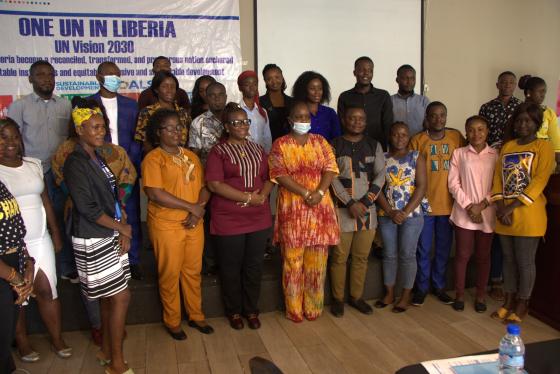UN Women Enhance Journalists Knowledge on Promoting Gender Equality for Sustainable Tomorrow

Journalists posed for photo with Fejal President, Madam Siatta Scott-Johnson, Gender Minister, Piso Saydee-Tarr shortly after the opening of the workshop
A day-long workshop and training session organized by the UN Women through its Communications Group in partnership with the Female Journalists Association of Liberia (FeJAL) has ended in Monrovia.
The training, which brought journalists from various media institutions including the Daily Observer, FrontPage Africa, The News, Inquirer, Truth FM, Bana FM, among others, was intended to increase journalists' knowledge on gender equality reporting in the country.
Held under the theme: “Promoting Gender Equality for a Sustainable Tomorrow, today for a sustainable tomorrow”, coincided with the theme of this year's International Women's Day celebration and national theme, “Breaking barriers, set the stage for Gender Equality", provided a forum for the exchange of ideas on how the media can promote gender equality for a sustainable tomorrow and the impact of climate change on women and girls.
The event was held on Wednesday 16, 2022 at the Bella Cassa Hotel in Monrovia with over 30 journalists including males in attendance.
“The UN recognizes the pivotal role of the media in shaping people’s opinions and perceptions and in helping people construct their identities, social norms, and values in relation to gender,” said Milena Harizanova, Acting Deputy Representative for UNICEF.
She spoke on behalf of the UNCG and the United Nations in Liberia. “We realize that the media are an important stakeholder in promoting gender equality. We are therefore gathered here today to set the stage for gender equality and break all barriers that hinder promotion and achievement of gender equality in Liberia,” she said.
The Minister of Gender, Children and Social Protection, (MGCSP) Honourable Williametta Saydee Tarr graced the occasion and applauded journalists for their role in promoting gender equality.
“Without you, the voice of victims of sexual and gender-based violence, for example, will not be heard across the country and to that, I say thank you,” said Hon. Saydee Tarr.
She advised the media that the doors of her Ministry were open to provide information on what the MGCSP is doing. We hope that we will see more of you coming up to us and
Saydee Tarr also highlighted that most of the time people report that cases of rape are going up, but in actual fact, people are actually reporting more. “There is heightened awareness because you are doing a lot of work and people are coming out to report,” she said.
Journalists’ knowledge on promoting gender equality in Liberia was enhanced by various presentations delivered by UN staff and other stakeholders. Mr Rarmon Garway, UN Women Program Manager for Women Economic Empowerment, and Jangai Lisa Gbemie, IOM Program Support Staff and Gender Focal Person made presentations on promoting gender equality for sustainable development, while Michael Vawah, WFP Resilience and capacity-strengthening focal point made a presentation on climate change in the context of Liberia and its impact on women and girls. Mrs. Siatta Scott Johnson, President of the Female Journalists Association, Alexander Cole, National Civil Society Council Communication Officer and Gloriah Ganyani, UN Women Communications Specialist made presentations on the role of the media in promoting gender equality in Liberia.
Ms. Ghoma Karloweah, UN Women Liberia Acting Head of Programs facilitated the official session of the program and highlighted that she was impressed that the number of women in the media is increasing compared to previous years when the field was mainly, male-dominated.
The journalists who attended the meeting committed to increasing coverage on women’s issues. They, however, highlight many challenges that women are not very comfortable to work with the media while calling on the government, UN, and its development partners to support them and hold capacity-building sessions on gender-sensitive reporting.
